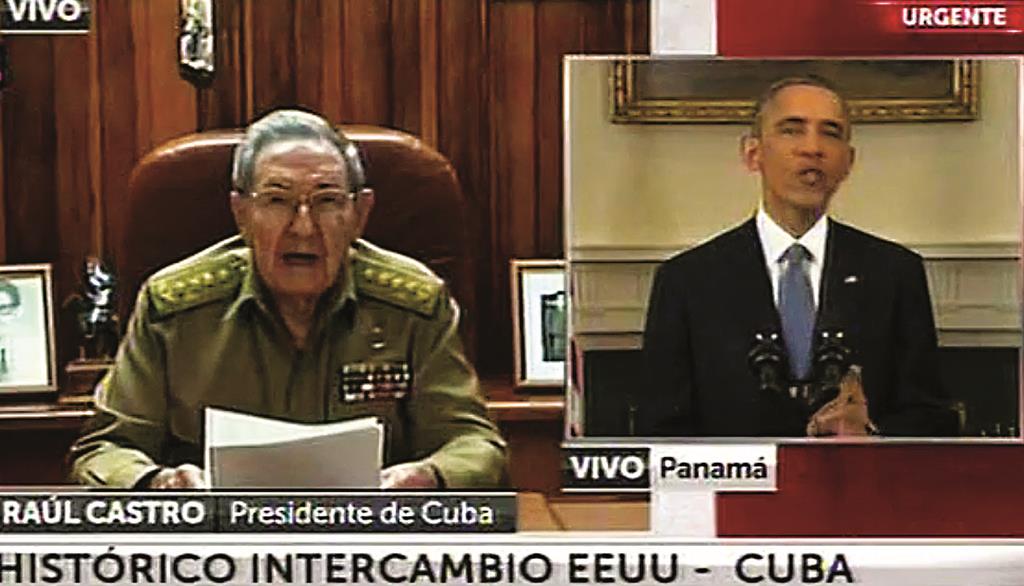Obama: U.S. Re-establishing Relations with Cuba

President Barack Obama announced the re-establishment of diplomatic relations with Cuba on Wednesday and declared an end to America’s “outdated approach” to the communist island in a historic shift aimed at ending a half-century of Cold War enmity.
“These 50 years have shown that isolation has not worked,” Obama said in remarks from the White House. “It’s time for a new approach.”
As Obama spoke to Americans, Cuban President Raul Castro addressed his own nation from Havana, saying that while the two countries still have profound differences in areas such as human rights and foreign policy, they must learn to live together “in a civilized manner.”
Wednesday’s announcement followed more than a year of secret talks between the U.S. and Cuba, including clandestine meetings in Canada and the Vatican and personal involvement from Pope Francis.
In Cuba, bells pealed and school children interrupted lessons to mark the historic news.
“This is like a shot of oxygen, a wish come true, because with this, we have overcome our differences,” said Carlos Gonzalez, a 32-year-old information technology specialist in Havana. “It is an advance that will open the road to a better future for the two countries.”
Obama’s plans are sweeping: He aims to expand economic ties with Cuba, open an embassy in Havana, send high-ranking U.S. officials to visit and review Cuba’s designation as a state sponsor of terrorism. The U.S. also is easing restrictions on travel to Cuba, including for family visits, official U.S. government business and educational activities. But tourist travel remains banned.
Obama’s action marked an abrupt use of U.S. executive authority. However, he cannot unilaterally end the longstanding U.S. economic embargo on Cuba, which was passed by Congress and would require action from lawmakers to overturn.
Licensed American travelers to Cuba will now be able to return to the U.S. with $400 in Cuban goods, including tobacco and alcohol products worth less than $100 combined. This means the long-standing ban on importing Cuban cigars is over, although there are still limits.
Some on Capitol Hill disagreed with his move.
Sen. Marco Rubio (R-Fla.) said the new U.S. policy would do nothing to address the issues of Cuba’s political system and human rights record.
“But it potentially goes a long way in providing the economic lift that the Castro regime needs to become permanent fixtures in Cuba for generations to come,” Rubio said.
Cuba also released a non-American U.S. intelligence ‘asset’ along with Gross. Officials said the spy had been held for nearly 20 years and was responsible for some of the most important counterintelligence prosecutions that the United States has pursed in recent decades. That includes convicted Cuban spies Ana Belen Montes, Walter Kendall Myers and Gwendolyn Myers and a group known as the Cuban Five.
The three Cubans released in exchange for the spy are part of the Cuban Five — a group of men who were part of the “Wasp Network” sent by Cuba’s then-President Fidel Castro to spy in South Florida. The men, who are hailed as heroes in Cuba, were convicted in 2001 in Miami on charges including conspiracy and failure to register as foreign agents in the U.S.
Two of the five were previously released after finishing their sentences.
This article appeared in print on page 2 of edition of Hamodia.
To Read The Full Story
Are you already a subscriber?
Click "Sign In" to log in!

Become a Web Subscriber
Click “Subscribe” below to begin the process of becoming a new subscriber.

Become a Print + Web Subscriber
Click “Subscribe” below to begin the process of becoming a new subscriber.

Renew Print + Web Subscription
Click “Renew Subscription” below to begin the process of renewing your subscription.












